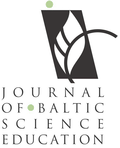MAKING CONCEPT MAPS USEFUL FOR PHYSICS TEACHER EDUCATION: ANALYSIS OF EPISTEMIC CONTENT OF LINKS
| Title | MAKING CONCEPT MAPS USEFUL FOR PHYSICS TEACHER EDUCATION: ANALYSIS OF EPISTEMIC CONTENT OF LINKS |
| Publication Type | Journal Article |
| Year of Publication | 2012 |
| Authors | Nousiainen, M |
| Journal | Journal of Baltic Science Education |
| Volume | 11 |
| Issue | 1 |
| Start Page | 29-42 |
| Date Published | March/2012 |
| Type of Article | Original article |
| ISSN | 1648-3898 |
| Other Numbers | ICID: 988260 |
| Keywords | concept maps, epistemic content, physics teacher education, science education |
| Abstract | In physics teacher education the use of graphical knowledge representation tools like concept maps are abundantly used because they are known to support the formation of organised knowledge. It is widely assumed that certain structural characteristics of concept maps can be connected to the usefulness of content. In order to study this relationship, the concept maps made by pre-service physics teachers are examined here. The design principles of the concept maps are based on quantitative experiments and modelling as the basic procedures in physics concept formation. The epistemic plausibility of justifications written in links is evaluated by using a four-level classification introduced here. The results show that the epistemic analysis of links affects remarkably to the acceptability of knowledge. The advantages of such concept mapping technique in supporting the conceptual understanding in physics teacher education are discussed as well as their usefulness in making plans for teaching. |
| URL | http://oaji.net/articles/2014/987-1419166729.pdf |
| DOI | 10.33225/jbse/12.11.29 |
| Refereed Designation | Refereed |
| Full Text |
